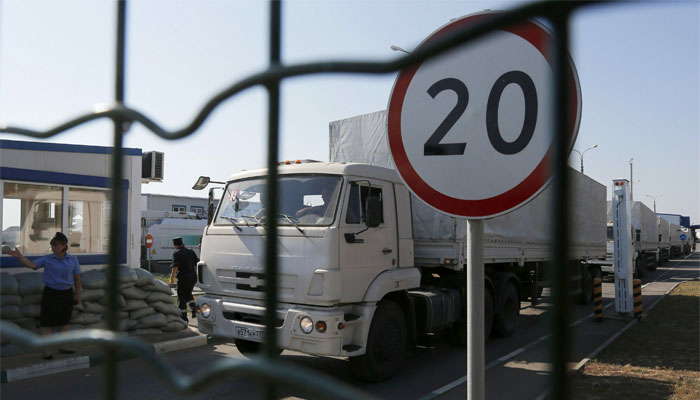Trucks from a convoy that delivered humanitarian aid for Ukraine move back to Russia at border crossing point "Donetsk" in Russia's Rostov Region. Reuters
AFP/Kiev
Parts of a mammoth aid convoy from Moscow on Saturday crossed back from rebel-held east Ukraine to Russian territory, as German Chancellor Angela Merkel jetted into Kiev for crisis talks.
The West had demanded that Russia withdraw its disputed trucks after the Kremlin unilaterally sent them to the insurgent stronghold of Lugansk on Friday in a move Kiev decried as an "invasion".
An observer for the Organisation for Security and Cooperation in Europe (OSCE) at the border told AFP that some of the white lorries had returned to Russia but could not specify how many were still inside Ukraine.
US President Barack Obama and Merkel had warned following a telephone call that the Russian decision to send in the convoy marked a "dangerous escalation" of the four months of conflict in Ukraine with Western fears mounting that it could presage Moscow sending in troops.
The European Union and the United States both called for Moscow to pull out the trucks immediately or face further isolation as they drove cross-border tensions to a new high ahead of an already tricky visit to Kiev for the German leader.
Merkel will have to tread a fine line in Ukraine, showing firm support for Kiev's pro-Western leaders while also pushing for them to halt their increasingly successful -- but brutal -- offensive.
Merkel, the most influential Western leader to visit Ukraine's pro-Western leaders, will hold talks with President Petro Poroshenko, three days ahead of the first meeting in months between Poroshenko and Russian President Vladimir Putin in Minsk alongside top EU officials.
Poroshenko has pledged to "talk peace" with Putin but insists that an end to the conflict that has cost more than 2,200 lives can be achieved only if pro-Kremlin fighters are pulled out of Ukrainian territory.
Analysts said that the visit by Merkel would be used "to consolidate the position of Kiev and the EU" in the run-up to the meeting with the Russian strongman or risk Moscow exploiting differences between the two sides.
"Putin will play on any contradictions between Kiev and Brussels and on Germany's objective economic interests," Oleksandr Sushko, the director of the Kiev-based Institute for Euro-Atlantic Cooperation, told AFP.
The European Union and the United States have already slapped the toughest sanctions on Moscow since the Cold War over the crisis in Ukraine, a move that led Russia to ban agricultural products from much of the West.

